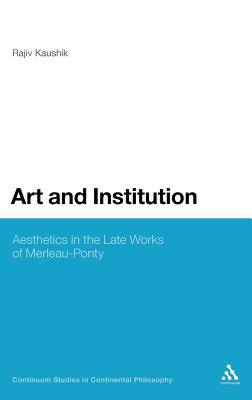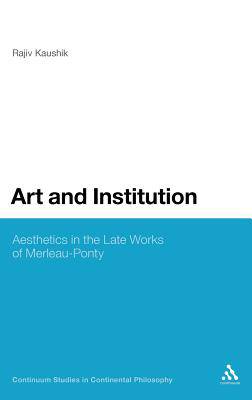
Je cadeautjes zeker op tijd in huis hebben voor de feestdagen? Kom langs in onze winkels en vind het perfecte geschenk!
- Afhalen na 1 uur in een winkel met voorraad
- Gratis thuislevering in België vanaf € 30
- Ruim aanbod met 7 miljoen producten
Je cadeautjes zeker op tijd in huis hebben voor de feestdagen? Kom langs in onze winkels en vind het perfecte geschenk!
- Afhalen na 1 uur in een winkel met voorraad
- Gratis thuislevering in België vanaf € 30
- Ruim aanbod met 7 miljoen producten
Zoeken
€ 339,45
+ 678 punten
Omschrijving
Art and Institution examines how for Merleau-Ponty the work of art opens up, without conceptualizing, the event of being. Rajiv Kaushik treats Merleau-Ponty's renderings of the artwork - specifically in his later writings during the period ranging from 1952-1961 - as a path into the being that precedes phenomenology. Replete with references to Merleau-Ponty's reflections on Matisse, Czanne, Proust and others, and featuring Kaushik's own original reflections on various artworks, this book is guided by the notion that art does not iterate the findings of phenomenology so much as it allows phenomenology to finally discover what, as a matter of principle, it seeks: the very foundation of experience that is not itself available to thought. Kaushik is thus concerned with the ways in which the work of art restores the principle of institution, prior to the intentional structures of consciousness, so that phenomenology may settle questions concerning ontological difference, the origination of significance, and the relationship between interiority and exteriority.
Specificaties
Betrokkenen
- Auteur(s):
- Uitgeverij:
Inhoud
- Aantal bladzijden:
- 192
- Taal:
- Engels
- Reeks:
- Reeksnummer:
- nr. 3
Eigenschappen
- Productcode (EAN):
- 9781441136633
- Verschijningsdatum:
- 11/08/2011
- Uitvoering:
- Hardcover
- Formaat:
- Genaaid
- Afmetingen:
- 156 mm x 234 mm
- Gewicht:
- 426 g

Alleen bij Standaard Boekhandel
+ 678 punten op je klantenkaart van Standaard Boekhandel
Beoordelingen
We publiceren alleen reviews die voldoen aan de voorwaarden voor reviews. Bekijk onze voorwaarden voor reviews.









